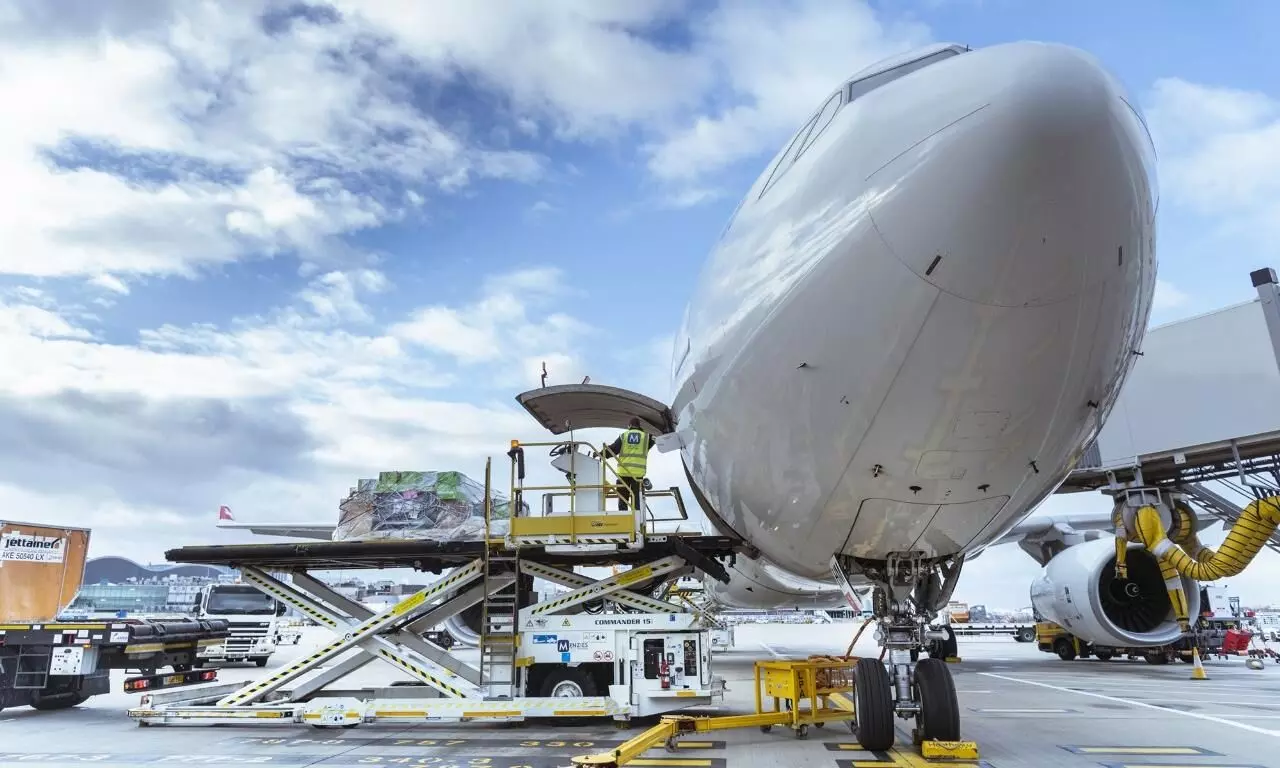
Enhancing cargo handling efficiency: Latest solutions

The air cargo industry is a vital player in global trade, yet it encounters challenges that necessitate inventive solutions. From congested airports to economic uncertainties, the imperative for efficient operations cannot be overstated. The industry's latest advancements, from AI-driven drones to sustainable practices are propelling cargo handlers towards enhanced efficiency and sustainability.
The air cargo industry is a vital global trade engine, yet even the most streamlined operations can encounter bottlenecks and delays. In today's global marketplace, efficient cargo handling is not just necessary, it's a strategic advantage for businesses striving to meet customer needs and thrive in a competitive environment. Imagine a world where the items you order online or the products you rely on daily simply can't reach you - this is where the critical role of cargo handling comes into play.
For the swift and efficient transportation of goods, shipping by air emerges as a standout choice. According to an estimation by the International Air Transport Association (IATA), airlines transport over 52 million metric tons of goods each year, accounting for more than 35% of global trade by value. This translates to a remarkable $6.8 trillion worth of goods annually, or $18.6 billion worth of goods every single day.
Cargo handling is part of the supply chain where goods are processed on the ground at the cargo facility. This includes everything from when they arrive at the airport to when they're ready to be loaded onto the plane and then unloaded at the destination for the consignee or freight forwarder.
However, things are not as smooth as they look from the outside and the roadblocks can stem from various sources. Cargo handling companies face a multitude of challenges that affect their efficiency and profitability. Operational hurdles, such as congested airports and limited capacity leading to delays, are compounded by a shortage of recruits. Wilson Kwong, Chief Executive of Hong Kong Air Cargo Terminals Limited (Hactl), notes, "The one factor that continues to challenge us is the difficulty of attracting new recruits, a problem shared with all airport businesses in Hong Kong – due to almost full employment, our remote location, the requirement for shift working and manual work, and the need to work outside in sometimes inclement weather." Navigating customs procedures adds further complexity and potential bottlenecks.
Economically, the industry grapples with significant risks posed by fluctuating fuel prices, global uncertainties, and currency fluctuations impacting profitability. Technological challenges emerge from inconsistent information systems, cybersecurity threats, and the rapid integration of new technologies.
Environmental concerns necessitate sustainable practices and responsible waste management. Furthermore, competition from alternative transport modes such as ocean freight and rail provides cost-effective alternatives, while airline industry consolidations increase pressure on margins. These multifaceted challenges demand strategic agility and innovative solutions for cargo handlers to thrive in this competitive environment.
Despite these challenges, the cargo handling industry is an essential part of the global economy. Cargo handlers play a vital role in moving goods around the world, and they are constantly innovating to improve their efficiency and adopting the latest solutions.
One significant avenue of progress is through technology, which plays a crucial role in advancing cargo handling operations, with one notable example being the introduction of the eLoading App by Jardine Aviation Services Group (JASG).
“We have launched an eLoading App for our staff. After the cargo pallet is loaded on the aircraft, the onsite supervisor and duty-in-charge can monitor the loading accuracy on the mobile device. For any discrepancies, it will trigger alerts to the frontline for rectification immediately. This has not only improved the safety of our operations but also enhanced the transparency and reliability of our services, providing our clients with peace of mind knowing their cargo is in safe hands,” says Chief Executive of JASG, Vivien Lau.
"The precision and reliability of the drones have surpassed our expectations, leading to a transformative impact on our efficiency levels."
Guillaume Crozier, dnata
Hactl is rolling out Automated Service Kiosks (ASKs) at their SuperTerminal 1 facility to enhance the import cargo collection process. These kiosks aim to mitigate long queues and waiting times frequently seen during peak periods.
“Our Performance Enhancement team has spent years identifying and solving inefficiencies, usually through tech-led solutions. Recent among the many examples of this is our new ASKs, which are progressively automating older paper-based processes surrounding collecting cargo, such as verifying ID documents to obtain release notes. This is drastically reducing import reception counter traffic and the time it takes customers to be served. We also digitised our ramp processes, so loading crews have instant updates to manifests and loading instructions without travelling to and from the ramp management office; this speeds loading facilitates late changes and bookings, and ensures all cargo is loaded on the correct flight,” says Chief Executive of Hactl, Wilson Kwong.
In order to optimise their cargo handling system and enhance data accuracy, Menzies Aviation launched the Menzies Aviation Cargo Handling (MACH) cargo management system last year. "Our new, best in class Menzies Aviation Cargo Handling (MACH) system was introduced last year, and our teams are working hard to roll-out the cargo management system to the remaining parts of our network by the end of 2024. Boasting a modern user interface (UI), optimised accessibility and the ability to seamlessly integrate with other systems, MACH improves the accuracy of the data we hold while generating genuinely bespoke solutions," explains Beau Paine, who serves as the Global Head of Cargo at Menzies Aviation.
The integration of Artificial Intelligence (AI) and drones is also revolutionising the field of cargo handling, dnata has introduced autonomous drones into its cargo operations at both Dubai International (DXB) and Dubai World Central (DWC) airports in the UAE. This integration aims to boost operational efficiencies by utilising computer vision technology for enhanced inventory monitoring. Gather AI, the software partner of dnata in this project, enables drones to do many tasks using just their cameras. They can map the area, collect inventory data, count items, check temperatures, and scan barcodes without needing extra equipment. The drones connect to a tablet that shows live inventory updates. Users can see all the data on the tablet or a simple web app. The drones are now part of the everyday work routine, assisting in warehouse inventory tasks seamlessly.
“The precision and reliability of the drones have surpassed our expectations, leading to a transformative impact on our efficiency levels. These advancements have a direct positive impact on our airline customers who can benefit from heightened accuracy, reduced turnaround times and smoother logistics operations,” says dnata’s senior vice president for UAE cargo and global cargo strategy, Guillaume Crozier.
Cargo handling companies are increasingly turning to robots to revolutionise their operations, focusing on improving efficiency, safety, and accuracy. This trend is driven by various factors, starting with the industry's ongoing struggle with labour shortages. Robots offer a solution to this challenge by taking on physically demanding and repetitive tasks, allowing human workers to focus on more complex responsibilities. Moreover, the adoption of robots in cargo handling operations is also aimed at enhancing overall efficiency. Various examples illustrate the diverse ways in which robots are integrated into air cargo handling operations. Automated Guided Vehicles (AGVs) are self-driving vehicles that efficiently transport cargo within warehouses, freeing up human workers for more intricate tasks. Robotic arms, on the other hand, are versatile machines capable of lifting, sorting, and palletizing cargo, thereby reducing manual labour and the associated risks of injury. Additionally, the implementation of Automated Storage and Retrieval Systems (AS/RS) further streamlines operations by employing robots to store and retrieve cargo from high-bay shelves, optimising space utilisation and improving access times.
Menzies has implemented a robot named 'Mimi' to track goods throughout every stage of the warehouse process. 'Mimi' plays a crucial role in enhancing inventory management and optimising slot utilisation within the warehouse.
Hactl on the other hand is also adopting robots in its operations “Hactl has been progressively adopting robotics over the past two years: first with our Automated Parts
Store that dispenses machinery parts for our handling systems around the clock, then with security robot patrols around the ramp area; and most recently with the deployment of our first driverless ramp tractors, which are being used to tow dollies in the ramp. There are other robotics applications that we plan to introduce, and these all help solve recruitment problems,” states Hactl’s Kwong.
Additionally, Ground handling companies are making strategic investments in air cargo terminals and cool chain complexes. This move allows them to diversify their service portfolio beyond traditional ground handling activities, capturing a larger share of the air cargo market and generating additional revenue through value-added services like cool chain management. By owning and operating these facilities, they gain greater control over the entire cargo handling process, leading to streamlined operations, improved efficiency, and cost savings. Additionally, they can implement stricter quality control measures, ensuring consistent temperature maintenance and minimising product spoilage, ultimately enhancing customer satisfaction. These investments are a response to growing market demands, particularly in the e-commerce and pharmaceutical sectors, where efficient and reliable air cargo transportation is crucial for temperature-sensitive goods.
Hactl has launched its new cool chain complex (CCC), providing a seamless handling process for temperature-controlled shipments. The cold chain complex features a dedicated area for dangerous substances with three separate temperature zones. Swissport International, inaugurated a new 4,000 square meter warehouse at Zaragoza Airport in Spain last year.
Sustainability is also key for making cargo handling more efficient. Cargo handling companies can promote sustainability by investing in electric or hybrid Ground Support Equipment (GSE) to reduce emissions, encouraging the use of sustainable aviation fuel (SAF), implementing energy-efficient practices, minimising water usage, establishing waste sorting and recycling programmes, adopting sustainable building designs are some examples.
“At Jardine Aviation Services, we are committed to balancing efficiency with sustainable practices in cargo handling. For the vehicles in the cargo apron, we have been replacing them with electric vehicles which is in support of the Electrification Roadmap of Airport Authority Hong Kong. In our frontline office, we are migrating paper forms into e-forms and mobile apps to minimize paper usage,’’ says Lau of JASG.
dnata has switched their vehicles to run on a biofuel blend. dnata's newest initiative is aligned with its goal to cut its carbon footprint and landfill waste by 20% by 2024. Menzies Aviation has installed almost 900 solar panels at its cargo facility at Prague Airport. According to Menzies, the panels are set to produce more than 350 megawatt hours (MWh) annually and reduce emissions across Menzies’ Prague operations by 25%.
While navigating diverse challenges, the air cargo handling industry is embracing transformation. Technological advancements like AI, drones, and robots are improving efficiency and accuracy. Investments in modern facilities and cool chain complexes cater to evolving needs. Sustainability efforts through electric equipment, alternative fuels, and waste reduction practices are gaining traction. As the industry prioritises innovation and adaptation, it remains a critical link in the global supply chain, ensuring efficient trade and economic growth.


